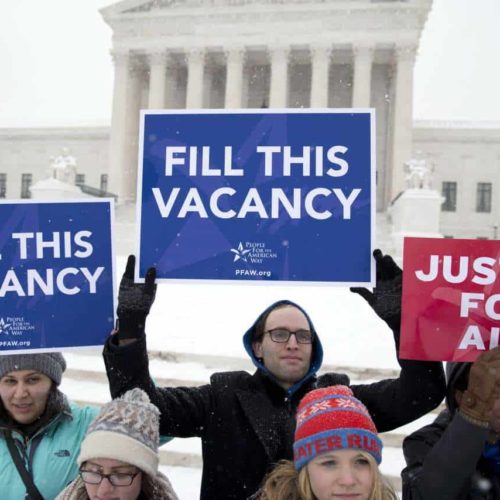This story was co-published with Newsweek.
Introduction
April 6, 2016: This story has been corrected.
The federal appellate judges mentioned as possible replacements for Supreme Court Justice Antonin Scalia have generally kept financially conservative profiles, according to a Center for Public Integrity database, but several made hefty salaries at prominent law firms before joining the bench.
As speculation rages about who President Obama might nominate to replace Scalia, the names of federal appellate judges Merrick Garland, Jane Kelly, Patricia Millett, Jacqueline Nguyen, Srikanth Srinivasan and Paul Watford keep popping up.
For the disclosures required of federal judges, five of the six reported relatively modest and uncomplicated financial holdings for 2012 — the most recent year readily available — compared with many of their colleagues sitting on appellate courts, the nation’s second highest level of courts.
All but one of the possible nominees, Garland, steered clear of investments in corporate stock ownership, which have been called a “mousetrap” for judges due to the potential for conflicts of interest with their caseloads. In a broader 2014 investigation, the Center for Public Integrity found 24 examples in which other federal appellate judges owned stock in companies with a case before them, a violation of federal law.

On the Supreme Court, where many cases are decided by a 5-4 split, such stock ownership can have an especially profound impact. Justices Samuel Alito, John Roberts and Stephen Breyer have had to recuse themselves from cases when their ownership overlapped with matters before the high court.
To be sure, the possible nominees’ finances could have changed since those 2012 reports. Their next disclosures, covering 2015, are due in mid-May.
But the 2012 financial disclosures do shed light on the heady salaries some received at top tier law firms — and the relative financial sacrifice that these lawyers took to become federal appellate judges who will earn $215,400 in 2016 instead of close to $1 million in private practice. All but Kelly have flitted between private firms and public service in their careers.
Five of the six have only recently joined the bench as Obama appointees, and have not had as much time to accrue one of the biggest perks of being a federal judge, free global travel for speaking engagements and teaching.
Still, two of the judges in the elite group would already fit in nicely with the current Supreme Court judges in one unusual way: two of them were landlords, just like five of the current members of the high court. See who below:
Merrick Garland, U.S. Court of Appeals for the District of Columbia Circuit
Garland, the sole appointee of the group not chosen by Obama, reported the most complicated financial portfolio of this group. In addition to other investments, the Clinton appointee is the only one to report owning stock in 2012, with holdings in big name companies such as Pfizer Inc., General Electric Co. and Citigroup Inc. He also was a landlord, earning as much as $100,000 in 2012 for a property in New York City.
Jane Kelly, 8th Circuit U.S. Circuit Court of Appeals
The Obama nominee reported one of the simplest sets of investments among this group: only three investment accounts and no direct stock holdings in 2012. The former federal public defender is the only one of the group who has not been employed by private law firms in her professional career. Another detail that sets her apart: she reported partial ownership of a family farm.
Patricia Millett, U.S. Court of Appeals for the District of Columbia Circuit
Millett, an Obama appointee, reported earning sizable salaries of about $1 million annually as a partner at Akin Gump Strauss Hauer & Feld in the two years before becoming a judge in 2013. The international firm, based in Washington, D.C., is one of the largest in the country and is known for its lobbying. Millett reported no direct stock holdings in 2012, choosing instead a portfolio of mutual funds, U.S. Treasury bonds and other vehicles. She was the only one of the judges on the possible short-list to report a spouse’s salary: her husband works as the office manager of the Florida Sugar Cane League, a trade association representing sugar companies.
Jacqueline Nguyen, 9th U.S. Circuit Court of Appeals
Nguyen, another Obama appointee, is also a landlord who reported collecting rent from one California property. She reported no direct stock holdings but did list almost two dozen other investments, including college savings accounts. After stints in private practice and in the U.S. Attorney’s Office in Central District of California, she joined the judiciary in 2002, initially as a California Superior Court judge.

Srikanth Srinivasan, U.S. Court of Appeals for the District of Columbia Circuit
Another lawyer who recently joined the judiciary, Srinivasan reported earning $1.3 million for a single year as a partner at the O’Melveny & Myers law firm in 2011, one of the biggest firms in the world. He also served on and off in the Justice Department’s Office of the Solicitor General. The Obama appointee reported no individual stock ownership in 2012 but did have well-diversified investments in dozens of mutual funds. He also appeared to be saving for future college bills for his teenaged twins using 529 accounts, tax-free education savings plans.
Paul Watford, 9th U.S. Circuit Court of Appeals
Watford appears to have the fewest assets of the bunch, based on his disclosure covering 2012. He reported no individual stock holdings and just three accounts: one with a credit union, one a retirement account and the third with his former law firm, the latter two accounts closed that year. The Obama appointee did report earning $328,000 from his former law firm Munger, Tolles & Olson, a Los Angeles-based litigation powerhouse, in what was apparently his salary for just the first five months of 2012 before he resigned to take a seat on the Ninth Circuit. He now earns less than that in a whole year as a judge based out of Pasadena, Calif.
Correction, April 6, 2016, 2:32 p.m.: An earlier version gave the incorrect due date for the disclosure reports covering 2015. They are due mid-May.
Read the 2012 reports:
Read more in Money and Democracy
Money and Democracy
Federal Election Commission dismisses complaint against rapper
Pras Michel bankrolled pro-Obama super PAC Black Men Vote
Money and Democracy
Tobacco giant gave $250,000 to group representing black-owned newspapers
Reynolds American also reveals donations to ‘dark money’ nonprofits


Join the conversation
Show Comments